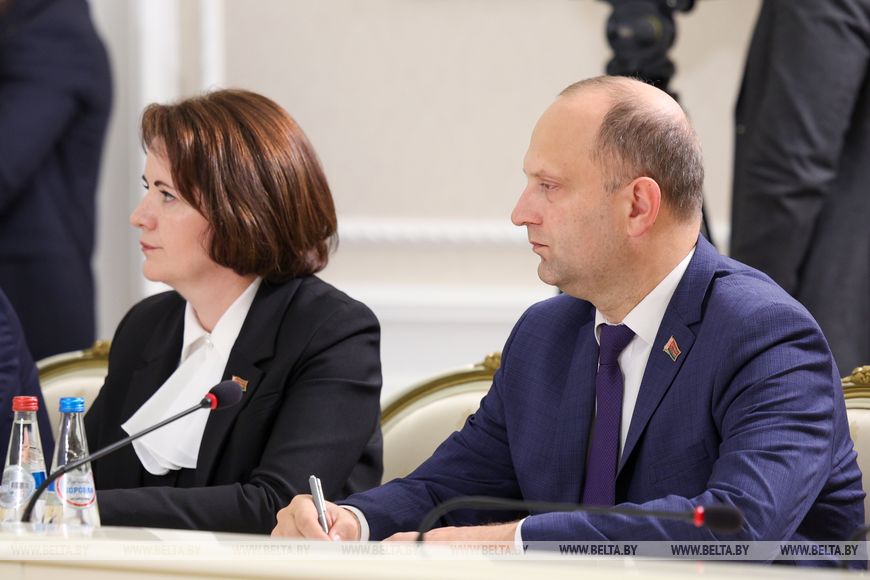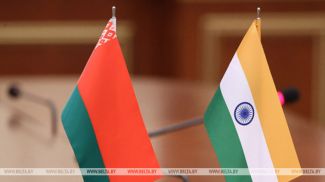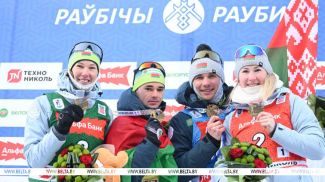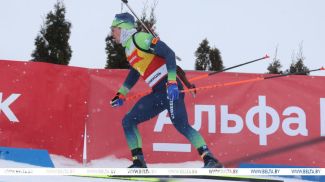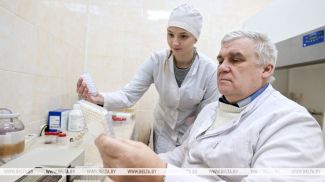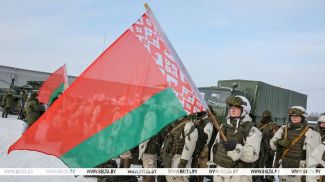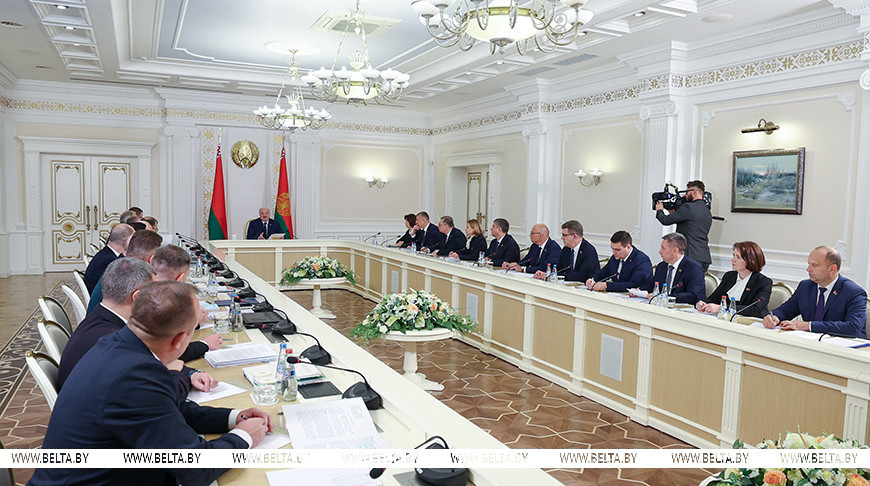
MINSK, 23 October (BelTA) – Belarusian President Aleksandr Lukashenko held a meeting with the leadership of the Council of Ministers in Minsk on 23 October, BelTA has learned.
The format of the event is traditional, as the head of state regularly holds such meetings with the government.
“Before making the most significant decisions, or those that strongly resonate in our society, we meet with you to consult. While making decisions, it is important for me to receive additional information from the initiators of particular issues,” the president noted.
This time, four pressing issues were on the agenda. They included the further development of the Belarusian Railways, the master’s degree system at Belarusian universities, the organization of the school meal system, and youth support.
On the work of Belarusian Railways and the state's contribution to its further development
Aleksandr Lukashenko said: “There is no doubt that the railway is the most important enterprise not only of the transport industry but of our entire country. Tens of millions of tonnes of freight are transported by rail every year. Those are raw materials, imports, and exports. It is the cheapest and safest mode of transportation for people. And although passenger transportation is more of a social aspect rather than a commercial aspect of the work, it is necessary to develop both.”
He stated that due to sanctions as well as the situation in Ukraine where several Belarusian freight trains have been literally seized as if by pirates and are being held, it was necessary to radically transform the traffic flow, come up with new logistics solutions, and get mobilized as a whole. Although revenues have decreased, Belarusian Railways’ shipping business remains profitable.
“According to the reports I am getting, the financial state of the enterprise is now exacerbated by the high cost of servicing the loans taken out for the sake of infrastructure projects and for buying new rolling stock,” the head of state noted.
In order to stabilize the situation, an executive order on state support for Belarusian Railways has been drafted.
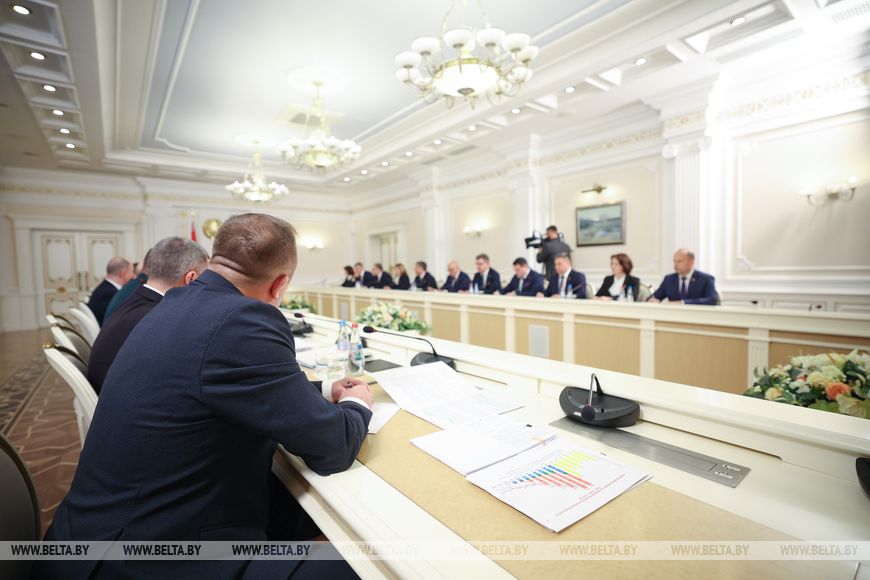
Simultaneously, Aleksandr Lukashenko recalled that the Belarusian Railways employees are not exactly ‘the poorest of people’. This is especially true in light of the facts uncovered by law enforcement agencies, which resulted in a number of officials from this sector being sent behind bars some time ago.
The president also outlined a general fundamental approach to providing government support across any sector. The head of state emphasized relying more on internal reserves rather than budget subsidies, so as not to come back "with a begging bowl" again after some time.
“Once again, I am warning you publicly: stop coming here for money. Stop. We have personnel, competencies, and in this case, trains, cars, planes, helicopters, and so on. Put them to good use,” Aleksandr Lukashenko.
Belarusian President Aleksandr Lukashenko has endorsed a proposal to provide state support to Belarusian Railways, Head of Belarusian Railways Valery Verenich told the media. Valery Verenich clarified that Belarusian Railways did not request new funding. The matter concerns an extension of the repayment period for the previously taken loans. “There is a specific amount that must be repaid within 5 years. This is a very heavy financial burden for us,” he said. “We asked to extend the repayment deadline by another 5 years, until 2035.”
Consequently, the financial burden of loan repayment will be reduced, and the freed-up funds can be channeled into repairs, infrastructure, and development. The loans were initially taken out to purchase rolling stock and for electrification, major infrastructure projects. “By investing in production, we understand that we can generate further earnings,” he noted.
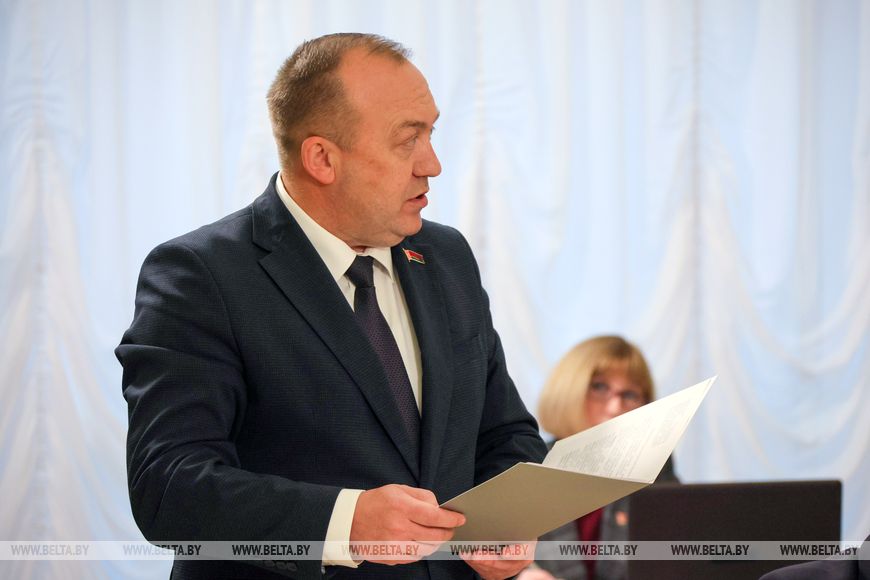
Lukashenko calls for review of master's degree system in Belarus
The master's degree system in Belarus became one of the topics of the meeting with the leadership of the Council of Ministers hosted by the president.
Aleksandr Lukashenko inquired about the current state of the master's degree system given the previously adopted decisions. In particular, it was decided that master’s programs should be intended for those who plan to pursue research and teaching in the future, and not for training “jack-of-all-trades” specialists in demand outside the country (for some time this idea was promoted by supporters of the Bologna Process).
The president drew attention to the fact that many foreign students study in Belarus and would like to pursue a master’s degree program. They pay for this education, and such a form of study, certainly, should be preserved for them.
Following the meeting, it was decided that the master’s program, as one of the stages of advanced higher education, will certainly remain. The specialists trained there are in demand at many enterprises introducing new technologies and in scientific organizations.
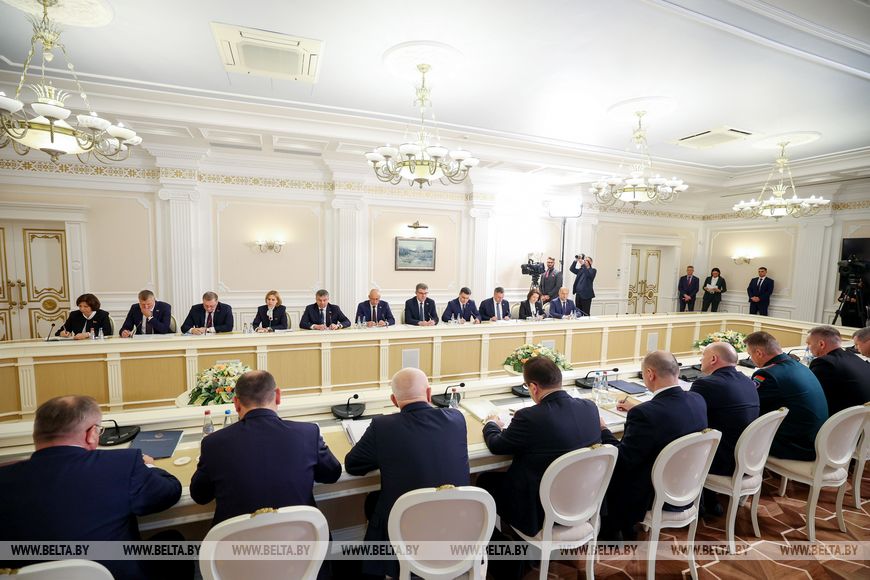
However, the focus in training personnel in master’s programs should be placed on specialties that are in demand. “The head of state emphasized that we must once again take a serious and balanced approach to training and programs. And most importantly, this must serve the interests of our country and society,” Belarus’ Education Minister Andrei explained.
According to him, all three educational tracks in master’s degree programs will remain: for Belarusian citizens, both state‑funded and tuition‑paying places will be available, while for foreign students the programs will continue to be tuition-based.
However, the admission quotas for master’s programs will be adjusted: they will be determined strictly in line with the state's demand, similar to the system currently in place for universities and colleges. Previously universities themselves set the number of state‑funded places and the list of specialties in master’s programs based on their own vision. The situation will now change: the number of state-funded places will depend on the demand for specific specialists.
Another significant change adopted following the meeting relates to the mandatory requirement to complete a master’s program for those seeking to continue their studies at postgraduate programs or pursue a career in teaching at universities. “The president once again stressed that artificial barriers for gifted and talented young people should be removed. This refers to students interested in pursuing scientific and research activities. These students should have the opportunity to enter postgraduate studies without first completing a master’s program. To this end, each university and its academic councils should be able to identify such students and make the appropriate recommendations,” the minister noted.
“Those young people who wish to remain in teaching positions after graduating from university should have the opportunity to do so without having to complete a master's program,” Andrei Ivanets added.
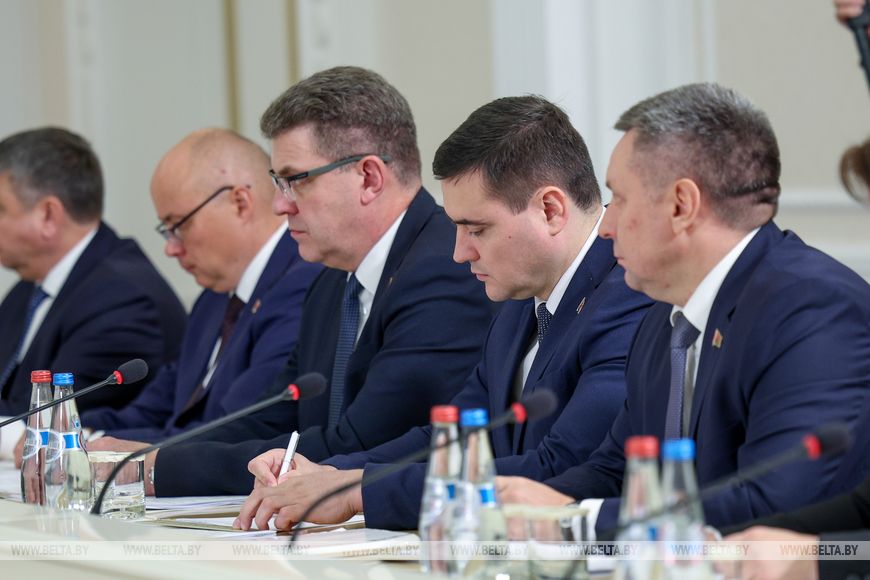
On tasty and healthy school meals
During the meeting, Aleksandr Lukashenko reviewed the current school meals system taking into consideration his earlier instructions.
Following reports from regulatory authorities about shortcomings in the school nutrition system, including complaints about food quality and the performance of cafeteria staff and food service centers, the president tasked officials with strengthening oversight.
The head of state remarked: “I have repeatedly warned you: robbing children and poisoning them with poor-quality food is criminal. And I then instructed you to develop a proper system. I would like to hear what has been done in this regard. How will we feed children so that the food is tasty, healthy, and stays warm?”
Following the meeting, the education minister explained that the school nutrition system is fundamentally sound and requires no major overhaul.
He reported that in recent years, the ministry has expanded the list of approved dishes (the so-called technological maps), modernized food service facilities and cafeterias, and taken steps to enhance staff professionalism: approximately 1,500 cooks received advanced training last year.
Meals are provided to over one million schoolchildren, with roughly 750,000 of them receiving state-funded meals. The minister acknowledged the inherent challenge of pleasing everyone, pointing out that even within a single family, children can have different food preferences, not to mention larger groups. He concluded that while a certain amount of waste in school cafeterias is inevitable, the overall goal is to reduce it by improving the quality and variety of the dishes. The minister affirmed that this remains a priority for ongoing attention.
On incentives for young professionals without over-regulation
A draft decree “On measures to support young people” designed to create conditions for attracting and retaining young professionals at enterprises was discussed at the meeting with the Belarusian president and the leadership of the Council of Ministers. The discussion centered on regulations governing the first job placement and employer-sponsored training agreements. The outcome was a consensus against over-regulation in this area.
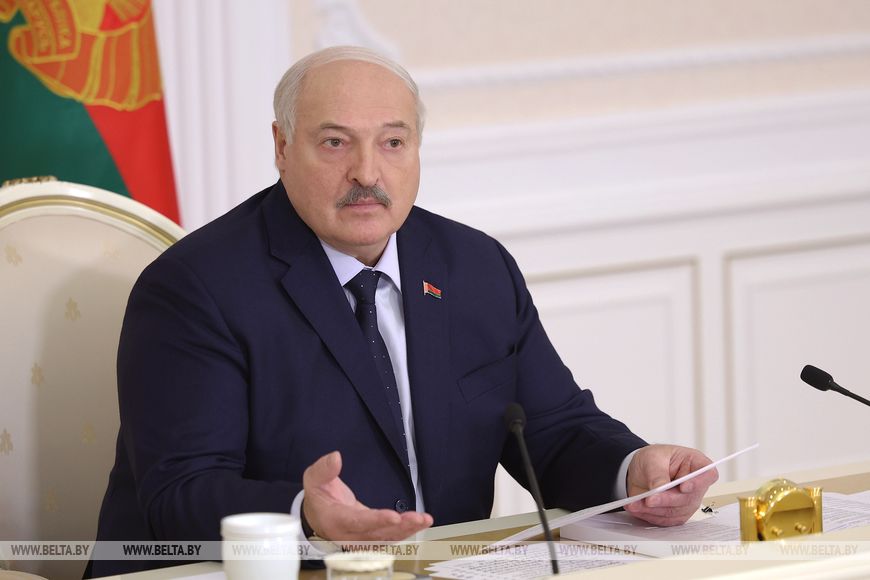
Aleksandr Lukashenko called for a balanced approach to this matter. He noted that assistance to young people should not turn into overprotection, as the state also needs to allocate funds to other areas, including the development of the manufacturing sector and the economy. Furthermore, at a young age, people are perfectly capable of working and earning a living on their own. This stands in contrast, for example, to elderly people, who for objective reasons may find it more difficult.
“I am not saying that we should not help young people. The youth are our future, and we must help them. Let us be specific about what we must help young people with, and leave it at that,” the head of state said. “We must create the conditions for young people to work.”
The president stressed that any promises made by the state regarding support or any benefits must be calculated and justified in advance, with the assurance that the state has the necessary funds to meet these future commitments. “We must be guided by reality, not just by constant demands for more benefits,” Aleksandr Lukashenko said.
The head of state has repeatedly pointed out that the country has no “extra” money. “And if we provide assistance and support to one part of our society, we must understand that this comes at the expense of those who work,” Aleksandr Lukashenko emphasized. “I want you to understand this logic when submitting proposals to me. I am frank with you. And let people judge my words for themselves.”
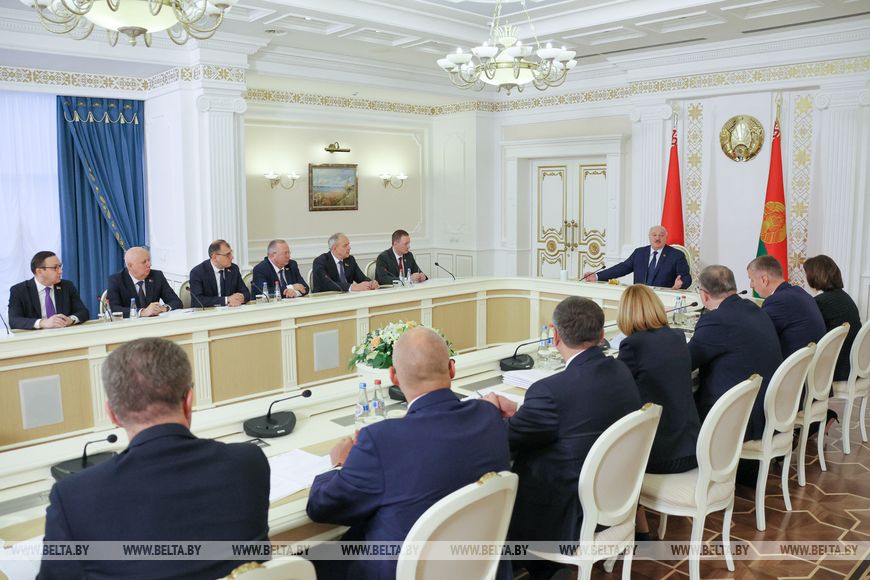
Consequently, the specific proposals suggested by the bill were reviewed but ultimately not endorsed. “Incentives for young professionals and relevant proposals are not limited to this bill,” stated Natalia Pavlyuchenko. “We will develop and propose new ideas. For now, we are postponing the measures discussed today to avoid excessive regulation.”
She explained that Belarus already has a robust system of support for young professionals at their first jobs, which includes a one-time payment and monthly bonuses. She noted that certain incentives are also stipulated in collective agreements between employees and employers.
As a recent example, she cited a decree signed by Aleksandr Lukashenko introducing additional payments for certain agricultural industry workers. The support system also includes fiscal measures, as young professionals are entitled to a standard tax deduction. Additionally, an employer-sponsored training agreement may include clauses on additional stipend payments from sponsor organizations.
“All these measures are systemic,” Natalia Pavlyuchenko emphasized.
